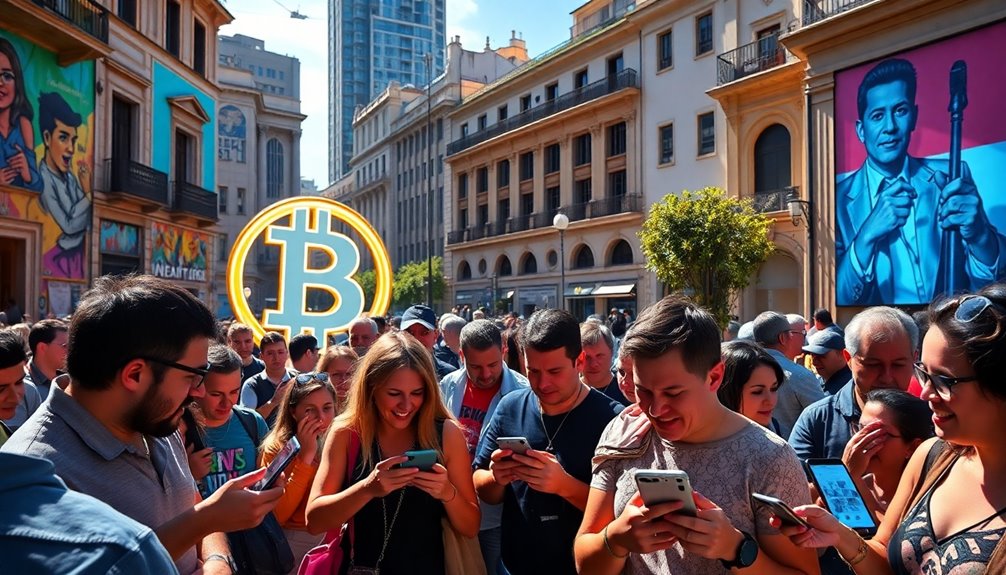The U.S. Treasury's "Shock and Awe" campaign outlines five criminal masterminds of the TGR Group, a notorious network that turned Russian money laundering into a global threat. You'll find Ekaterina Zhdanova, George Rossi, and Elena Chirkinyan among them, all key figures in shifting illicit funds through cryptocurrency and cash. They employ sophisticated techniques like layering and smurfing to evade scrutiny, leaving international authorities racing to catch up. Recent sanctions have targeted their operations, but the threat persists. Keep following this crisis to uncover more about their intricate schemes and the ongoing global response.
Key Takeaways
- The TGR Group, led by George Rossi and Elena Chirkinyan, specializes in laundering Russian funds through cryptocurrency and international networks.
- Ekaterina Zhdanova plays a crucial role in handling ransomware payments and facilitating money movement via exchanges.
- Khadzi-Murat Dalgatovich Magomedov coordinates bulk cash and crypto laundering operations, enhancing the group's illicit financial activities.
- Sergey Sergeevich Ivanov is linked to PM2BTC, offering unregulated currency exchange services that support TGR's money laundering efforts.
- The U.S. Treasury's sanctions have targeted these masterminds, freezing over $8 million in assets and disrupting their global operations.
Overview of TGR Group

The TGR Group operates as a sophisticated criminal network that spans the globe, leveraging its extensive connections to facilitate various illicit financial activities.
You'll find that this international network specializes in money laundering, cash and cryptocurrency exchanges, and providing pre-paid credit card services. By obfuscating the source of funds, it effectively integrates these illicit activities into the global financial system.
One of the group's primary focuses is on helping Russian elites circumvent U.S. and international sanctions. They utilize digital assets, such as stablecoins like Tether (USDT), to carry out their operations. Additionally, the group is known for its involvement in organized crime, which further complicates the efforts of law enforcement agencies.
The TGR Group collaborates with sanctioned entities and uses Russian cryptocurrency exchanges, like Garantex OU, to launder funds effectively. This enables high-net-worth Russian nationals to purchase properties in the UK without raising suspicion.
To combat these activities, international authorities have stepped in, coordinating efforts to disrupt the TGR Group's operations. Their actions have led to significant arrests and the seizure of over £20 million in cash and cryptocurrency, revealing the extensive financial implications of TGR's schemes in the global landscape.
Key Players in the Scheme

Within the intricate web of the TGR Group's operations, several key players emerge, each playing an essential role in facilitating money laundering and sanctions evasion for Russian elites. You've got Ekaterina Zhdanova, who's heavily involved in laundering ransomware payments and moving large sums of money abroad using cryptocurrency exchanges like Garantex and Bitzlato. The network's activities have drawn significant attention from international authorities, leading to increased scrutiny on entities linked to Russian financial systems.
Then, there are George Rossi and Elena Chirkinyan, the leaders of the TGR Group, who specialize in converting illicit funds into cryptocurrency and enabling property purchases in the West. Khadzi-Murat Dalgatovich Magomedov coordinates bulk cash and crypto laundering efforts, while Sergey Sergeevich Ivanov is linked to PM2BTC, which is notorious for its role in illicit finance.
Here's a quick overview of these players:
| Name | Role |
|---|---|
| Ekaterina Zhdanova | Laundered funds for Russian elites |
| George Rossi & Elena Chirkinyan | Leaders of TGR Group, key in money laundering |
| Khadzi-Murat Dalgatovich Magomedov | Coordinated cash and crypto laundering |
| Sergey Sergeevich Ivanov | Operated illicit currency exchange services |
| Additional Associates | Supported various criminal activities |
These individuals exemplify the complex network enabling Russian money laundering.
Techniques of Money Laundering

Money laundering techniques are sophisticated and often involve multiple layers designed to obscure the origins of illicit funds. One common method is layering, where you conduct numerous transactions using various financial instruments like bank accounts, traveler's checks, and international wire transfers. This complexity is heightened by moving funds across different jurisdictions to avoid detection.
In integration, you might invest in legitimate businesses, blending illicit funds with operational expenses. This can include purchasing high-end products to create a façade of legitimate economic activity. Additionally, understanding the three main stages of money laundering—placement, layering, and integration—is crucial for recognizing and combating these techniques.
Another tactic is smurfing, which involves breaking down large sums into smaller, less suspicious amounts. You could recruit individuals, known as smurfs, to make multiple small deposits that fall below reporting thresholds, effectively spreading transactions across several bank accounts.
Digital assets and offshore accounts add another layer of sophistication. Using cryptocurrencies, you can achieve anonymity and concealment by converting bulk cash into stablecoins. Offshore accounts in jurisdictions with strict bank secrecy laws further facilitate this process, often involving unregistered exchange services and pre-paid credit cards to mask the origin of the funds.
Operation Destabilise Explained

Operation Destabilise represents a significant breakthrough in the fight against sophisticated money laundering networks tied to Russian organized crime.
This international investigation, led by the National Crime Agency (NCA), has exposed the extensive reach of these networks across the globe, including the UK, the Middle East, Russia, and South America.
Two key Russian-speaking networks, Smart and TGR, were identified as vital players in supporting serious and organized crime worldwide.
Key aspects of Operation Destabilise include:
- Arrests and Seizures: 84 individuals arrested, with over £20 million in cash and cryptocurrency seized.
- Key Figures: Nikita Vladimirovich Krasnov and Ekaterina Zhdanova emerged as essential money laundering figures, while George Rossi heads TGR.
- Impact on Crime: These networks facilitated drug trafficking, ransomware, and even espionage activities, posing a significant threat to the UK's economic integrity. The operation highlighted a complex scheme for laundering money across multiple countries, showcasing the global reach of these criminal networks.
Financial Market Repercussions

You can't ignore the ripple effects of Russia's economic isolation on global markets. As sanctions tighten and commodity prices soar, you're likely to feel the impact on everything from energy costs to inflation rates. Understanding these financial market repercussions is essential as they shape the economic landscape around you. Recent efforts, such as Operation Destabilise, have aimed to dismantle money laundering networks that exacerbate these issues.
Global Economic Impact
Instability in global financial markets has surged in response to the ongoing geopolitical tensions linked to Russia's actions. You've likely noticed the sharp declines in equity markets, especially in Russia and emerging markets in Europe and Asia. This volatility has extended to U.S. Treasury and equity markets, driven by geopolitical uncertainty and shifting investor sentiments.
Here are some key impacts you should consider:
- Investor demand has shifted towards haven assets, like gold, as risk aversion grows. Diversification into gold and other safe-haven assets can help mitigate losses during turbulent times.
- Russian banks are grappling with severe strain due to their disconnection from the SWIFT network, elevating risks for European banks with significant exposure to Russia. Additionally, the potential for geothermal heat pumps to enhance energy efficiency may provide long-term economic benefits amid rising energy costs.
- Capital flight from Russia has intensified, alongside a rise in illicit financial activities aimed at evading sanctions. This is particularly concerning given that Russia has experienced significant illicit financial outflows, which exacerbate the country's economic challenges.
As these trends unfold, the performance of crypto-assets also declined, reflecting the broader market's pivot to lower-risk investments.
You can see how these dynamics not only affect individual markets but also have far-reaching effects on global economic stability, creating a cycle of risk aversion and uncertainty that could take time to resolve.
Commodity Price Increases
As geopolitical tensions continue to influence global markets, commodity prices have entered a phase of heightened volatility, considerably impacting financial landscapes.
You'll notice that this volatility can be particularly detrimental to commodity-exporting countries, stalling long-term economic growth. When prices fluctuate considerably, government finances often follow suit, creating uncertainty that affects public investment and amplifies domestic inflation. This instability can lead to erratic government finances and erratic public investment that further complicates economic recovery efforts.
In the energy sector, you may see prices softening due to weak global demand, specifically a slowdown in Chinese oil consumption.
On the other hand, robust crop forecasts for agrifood commodities could mitigate price spikes in the coming years. However, metal prices have faced declines, driven by sustained demand weakness and improved supply conditions.
Higher commodity prices can escalate living costs and production expenses, potentially leading to stagflation. This scenario erodes real income and dampens firm investment demand.
Although anticipated interest rate cuts in the U.S. and Eurozone may stimulate growth, they mightn't considerably impact metal prices in 2024. With improved supply and stocked warehouses, larger price increases in metals are likely to remain capped, revealing the interconnectedness of these market dynamics.
Sanctions Against TGR Group

Recent sanctions against the TGR Group have targeted key figures and entities involved in their extensive money laundering operations. The U.S. Treasury imposed these sanctions to disrupt their global network, aiming to hold accountable those who facilitate illicit financial activities. This action aligns with ongoing efforts to combat blocked persons' property that are subject to U.S. regulations.
This crackdown included individuals like George Rossi and Elena Chirkinyan, who play pivotal roles in running the organization.
Here are some of the main consequences of the sanctions:
- Frozen Assets: Tether froze $8 million worth of tokens in over 30 wallets linked to the TGR Group.
- Seized Assets: More than $25 million in cash and cryptocurrency was confiscated.
- Arrests: Authorities made over 80 arrests of Russian-speaking suspects tied to TGR's illicit operations.
These measures are part of a broader strategy to dismantle the TGR Group's money laundering schemes, which involved complex layering and integration of funds through unregistered services.
Regulatory Actions and Responses

As you explore the regulatory actions aimed at curbing Russian financial activities, you'll see how targeted sanctions have been implemented against key players in the financial sector. You'll also notice the importance of international collaboration in enforcing these measures and the unique challenges posed by cryptocurrency regulation. Understanding these dynamics is essential for grasping the broader impact on Russia's access to global finance, especially as over 50 Russian banks have been designated to limit international financial abuse. These sanctions demonstrate a concerted effort to isolate Russia’s financial networks and prevent the circumvention of restrictions through alternative systems. However, Putin’s Bitcoin dollar challenge highlights the emerging complexities tied to the use of cryptocurrencies as potential tools to bypass traditional financial oversight. This underscores the need for more robust regulatory frameworks and enhanced collaboration between nations to address loopholes and safeguard the integrity of the global financial system. These developments emphasize the critical need to address vulnerabilities within existing sanction frameworks, particularly as adversarial actors exploit innovative methods to evade restrictions. The so-called American money magic loophole has become a focal point for analysts scrutinizing how gaps in regulatory oversight may inadvertently enable financial manipulation or laundering schemes. Strengthening global partnerships and adopting adaptive strategies will be pivotal in closing such loopholes and sustaining the pressure on Russia’s financial operations.
Targeted Sanctions Implementation
Targeted sanctions implementation has become an essential tool in combating the complex networks that facilitate sanctions evasion, particularly in relation to Russian elites. The U.S. Treasury, through the Office of Foreign Assets Control (OFAC), has made significant strides in disrupting these networks. By sanctioning individuals and entities tied to the TGR Group, they've effectively targeted the financial facilitators enabling illicit activities.
Key actions include:
- Designating PM2BTC as a primary money laundering concern, impacting associated exchanges like Cryptex.
- Sanctioning a Wyoming-based entity owned by a sanctioned individual, showcasing the focus on complex ownership structures.
- Targeting Russian individuals and companies involved in technology procurement for military purposes. Additionally, these efforts are bolstered by collaborative international efforts aimed at dismantling financial networks supporting cybercriminals.
These measures aim to mitigate risks to the U.S. financial system while complicating the operational capabilities of Russian elites.
International Collaboration Efforts
International collaboration has proven essential in the fight against the intricate networks supporting sanctions evasion, particularly those linked to Russian entities. Initiatives like Operation Destabilise exemplify this effort, involving close coordination with UK law enforcement and partners such as OFAC, the FBI, and the DEA. The operation has resulted in over £20 million in cash and cryptocurrency being seized, further crippling the financial capabilities of these networks.
The REPO Task Force, launched by multiple countries including the US and EU, works to isolate sanctioned Russian individuals and entities, amplifying pressure on their operations. Countries like Canada and the UK have imposed extensive sanctions on Russia-linked individuals and businesses, targeting those benefiting from corruption.
The Financial Action Task Force's suspension of Russia's membership highlights the global commitment to uphold anti-money laundering standards. In addition, the NCA has collaborated with UAE authorities to disrupt money laundering activities tied to these networks.
Cryptocurrency Regulation Challenges
Maneuvering the complex landscape of cryptocurrency regulation poses significant challenges for businesses and regulators alike. The regulatory environment is marked by uncertainty due to varying approaches across different countries and overlapping jurisdictions among U.S. federal and state regulators. This complexity makes compliance difficult, especially as expectations for supervision continue to grow.
As the EU's MiCA regulation is set to impose new requirements on stablecoin issuers in 2024, this reflects the growing need for regulatory clarity.
You might face several hurdles, including:
- Regulatory Gaps: As crypto technology firms connect with traditional finance, gaps and overlaps can complicate compliance efforts.
- Enforcement Actions: Agencies like the DOJ, SEC, and CFTC are increasingly targeting misuse of cryptocurrencies, demanding rigorous anti-money laundering (AML) and know-your-customer (KYC) practices.
- Consumer Protections: Regulators emphasize protecting consumers from fraud and market volatility, with enforcement actions against non-compliant exchanges becoming more common.
In this evolving landscape, staying ahead of regulatory changes is vital. High levels of scrutiny require substantial resources for compliance, particularly for startups.
Without robust strategies, you risk facing significant fines and legal consequences, making clear direction from your board essential in maneuvering these challenges.
Historical Context of Russian Crime

While organized crime in Russia has deep historical roots, its evolution into a formidable force can be traced back to the 18th and 19th centuries. Early criminal groups, known as "thieves-in-law," established intricate networks that would later form the backbone of the modern Russian mafia. Despite suppression under the Soviet regime, these activities flourished underground, with state control limiting but not eradicating criminal enterprises. The emergence of thieves-in-law established strict codes and hierarchies within a criminal subculture that influenced the development of organized crime dynamics.
The era of Perestroika marked a significant pivot. Mikhail Gorbachev's policies dismantled state-controlled industries, creating fertile ground for organized crime. Oligarchs emerged, many with ties to these criminal networks, further complicating the landscape.
Here's a quick look at key historical events that shaped Russian organized crime:
| Year | Event |
|---|---|
| 18th Century | Emergence of "thieves-in-law" |
| 1917 | Bolshevik Revolution, suppression begins |
| 1980s | Criminal activities push underground |
| 1989 | Gorbachev's glasnost and perestroika |
| 1990s | Rise of oligarchs and organized crime |
This historical context sets the stage for understanding the current transnational operations of Russian organized crime.
Implications for Global Security

Understanding the implications of Russian money laundering is essential for global security. This illicit activity not only supports the Kremlin's aggressive foreign policy but also poses a significant threat to national security across the globe.
By concealing and facilitating dangerous operations, Russian money laundering undermines the integrity of the international financial system and exploits vulnerabilities within the U.S. financial framework.
Key implications include:
- Sustaining Russian Operations: Money laundering allows oligarchs to maintain ill-gotten wealth, directly supporting military efforts like the invasion of Ukraine.
- Economic Stability Risks: Nations on the FATF blacklist face severe reputational damage, which can lead to economic ruin and market distortion. FATF's blacklisting can significantly impact a nation's financial reputation and lead to increased scrutiny on international financial transactions.
- Regulatory Gaps Exploitation: Complex networks involving state-owned enterprises and organized crime complicate tracking illicit finances, highlighting the need for enhanced KYC procedures.
To combat these threats, international cooperation and improved transparency are crucial.
Frequently Asked Questions
How Can Individuals Report Suspected Money Laundering Activities?
If you suspect money laundering activities, you can report them to the appropriate authorities.
For financial institutions, you should notify your supervisor, who can initiate a Suspicious Activity Report (SAR).
If you're outside of a financial institution, you can contact local law enforcement or submit a report to the Financial Crimes Enforcement Network (FinCEN).
Providing detailed information, such as transaction patterns and involved parties, will help authorities investigate effectively.
What Are the Penalties for Sanctions Violations?
When it comes to sanctions violations, you might find the consequences a bit intimidating.
In the U.S., fines can hit a whopping $1 million, and imprisonment could stretch up to 20 years.
Over in the UK, you could face unlimited fines and up to seven years behind bars.
France isn't lenient either, with penalties reaching five years and hefty fines.
How Does Cryptocurrency Facilitate Money Laundering?
Cryptocurrency facilitates money laundering by enabling anonymity and bypassing traditional financial regulations.
You can use decentralized exchanges (DEXs) to trade stolen tokens without revealing your identity, making it easier to conceal illicit funds.
Techniques like smurfing break down large transactions into smaller ones, avoiding detection.
Additionally, sanctioned entities continue to operate, allowing you to launder money through various channels, effectively obscuring the origin of the funds involved.
What Impact Do These Crimes Have on Everyday Citizens?
Imagine waking up in a world where crime weaves through your community like a shadow, quietly influencing your life.
These crimes ripple through society, driving up prices and destabilizing economies. You might see your taxes increase to fight against the illicit flow of money.
The drugs and violence that stem from organized crime can affect your safety and well-being, creating a heavy burden for everyday citizens like you, who just want to feel secure.
How Can Countries Improve Their Financial Regulations Against Such Schemes?
To improve financial regulations against money laundering schemes, you can implement stronger Know Your Customer (KYC) policies and enhance Anti-Money Laundering (AML) programs.
It's essential to leverage technology for monitoring transactions and conduct regular audits.
Collaborating internationally will help establish uniform standards, while training employees on AML procedures increases vigilance.
Streamlining regulatory oversight guarantees consistent enforcement, and focusing on high-risk jurisdictions allows for more targeted actions against illicit financial activities.
Conclusion
In the shadowy corners of global finance, the TGR Group's intricate web of deceit has spun a tale of danger and intrigue. As the world grapples with the fallout, it's clear that these criminal masterminds didn't just play with Russian money—they ignited a financial wildfire. Your awareness and vigilance are essential in this unfolding saga, as we navigate the treacherous waters of global security. Together, let's shine a light on the darkness and reclaim our financial future. Their elaborate schemes, concealed behind layers of shell companies and offshore accounts, have unraveled, leaving a trail of shattered trust and economic instability. With Russia’s moneylaundering empire exposed, the international community faces mounting pressure to dismantle these operations and hold the perpetrators accountable. This is a pivotal moment to strengthen cross-border cooperation and ensure such exploitation is met with unwavering justice.










